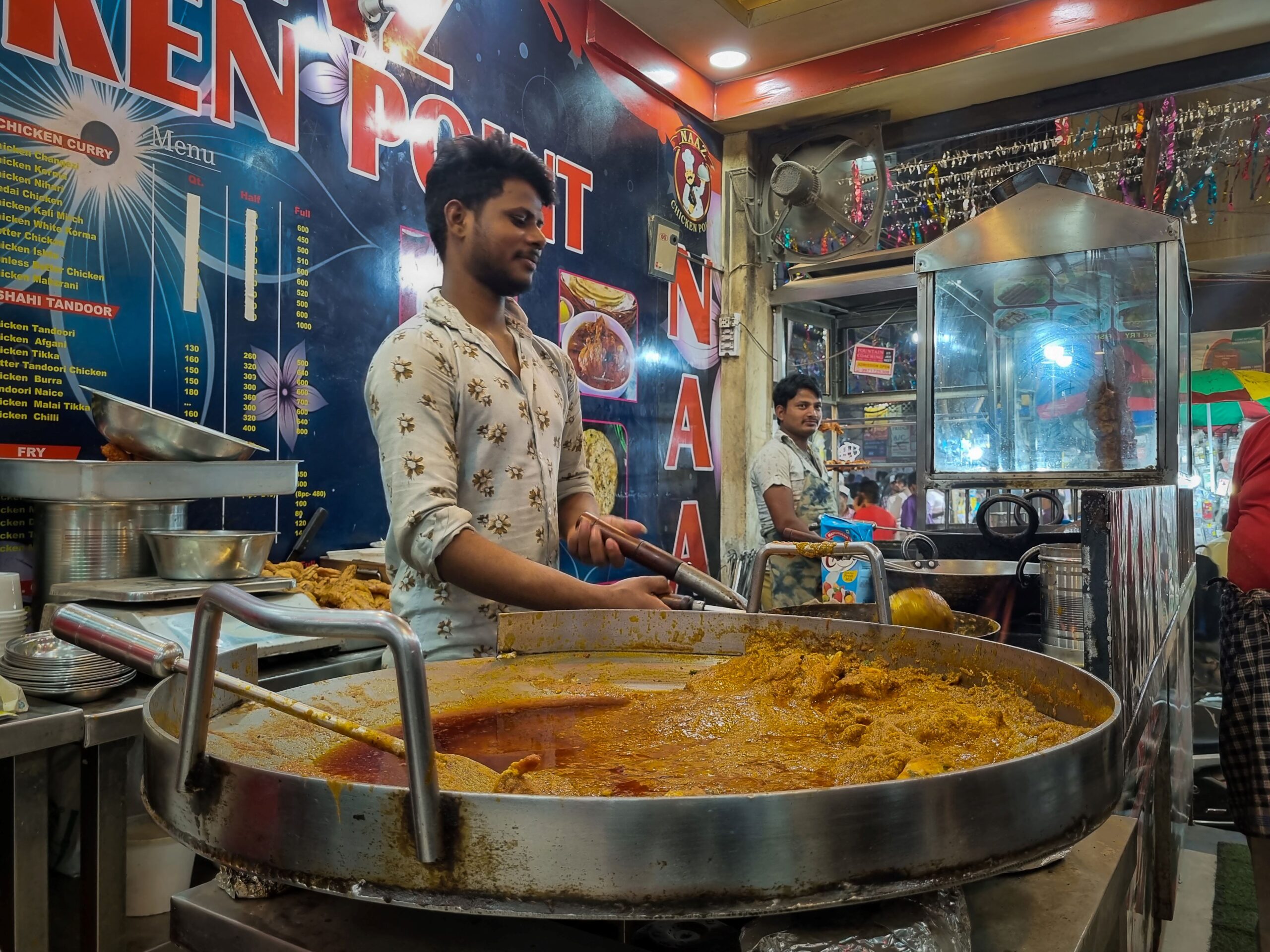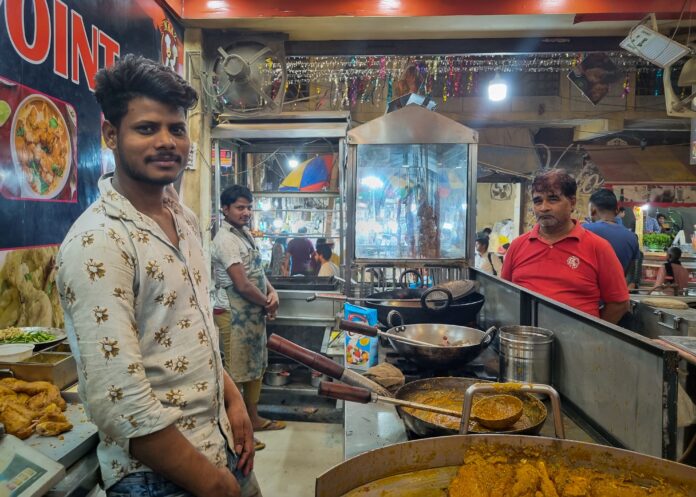How Rafiq cooks for 100 people while going without food and water
Ubair Ul Hameed, TwoCircles.net
As the sun sets over the bustling streets of Delhi’s Zakir Nagar locality on a hot April day, Mohammad Rafiq takes his position behind a gas burner, surrounded by pots and pans of steaming hot food. The air of the kitchen is thick with the aroma of spices and freshly baked bread, and the ambient sound a cacophony of clanging utensils, sizzling oil and chattering staff. None of this, however, seems to faze Rafiq, who hasn’t sipped a drop of water or eaten a morsel of food for over 13 hours. “Fasting is a challenge in this kind of situation but we somehow manage,” he says, as he expertly flips pieces of chicken on a large wok.
Rafiq, 23, hails from Kishanganj in Bihar and has been working at the Naaz Chicken Point restaurant for about three years. Open through the year from 11 am to 11:30 pm, the restaurant extends its timings to 5 am in Ramadan as most of its customers come from Zakir Nagar, and surrounding areas like Jamia Nagar and Shaheen Bagh, all inhabited largely by Muslims. Business during the daytime is low as most people are fasting from dawn to dusk, but picks up at the time of iftaar, or breaking of the fast, at sunset. The restaurant is open through the night, with customers also walking in for sehri, the meal eaten at the break of dawn, before the daylong fast begins.
At the end of a hectic night, with not a wink of sleep, Rafiq eats his sehri, performs his morning prayers, and heads to the local market at 6 am to gather fresh vegetables, spices, and other necessary ingredients for his kitchen.
He then sleeps for around six hours, waking up at noon, before heading to the restaurant at around 2 pm. The restaurant is quiet at this hour, with no customer, but a sudden rush of 80-100 people is expected to walk in for dinner after iftaar. So, Rafiq wastes no time in the kitchen, preparing the spices and cooking the chicken to perfection.
To check the taste of his dishes during Ramadan, a fasting Rafiq uses a variety of methods. First, he relies on his sense of smell to detect any subtle nuances in the spices and ingredients he is using. He takes deep breaths of the steam rising from his pots and pans, inhaling the scents of cumin, coriander, and cinnamon. In addition to his own taste buds, Rafiq also relies on feedback from fellow cooks, who may not be fasting. Rafiq’s Changezi chicken, achari chicken, chicken tikka and biryani are popular in the area for their rich flavors and perfectly cooked chicken.
In between, he takes breaks to go the masjid to say his prayers. “Ramadan is not just about abstaining from food and drink during the day,” he says.
“It is also about taking on additional spiritual practices, such as prayer and charity to deepen our connection with our faith.” Rafiq makes it a point to spend more time in the mosque for congregational prayers and reciting the Quran during the month. “Luckily, the restaurant owner is a practicing Muslim and understands my spiritual needs,” he says.
He adjusts his work schedule to accommodate his prayer times, especially during the evening prayer, which coincides with iftar, and the rush at the restaurant. “Because of the rush, I balance my religious duties with my work. It can be difficult, but I somehow find a way to make it work,” he says.
At around 6.40 pm, after spending the day on his feet preparing varieties of chicken dishes, Rafiq finally gets a chance to sit down and break his fast. His iftar spread includes dates, samosas, pakoras, fruits, and a glass of water or Rooh Afza. Yes, the chicken is conspicuous by its absence.
“It is a tradition of Prophet Muhammad (peace be upon him) to break the fast with dates and water. Dates are a nutritious food that can give immediate energy after a long day of fasting, and water is essential for rehydration. Our chicken dishes are usually reserved for dinner since they are quite heavy,” he says.
There is no time to relax after iftaar. Rafiq “rushes” to the masjid for prayer, and then returns hurriedly for the “busiest hour at the restaurant”, the post-iftaar rush for dinner.
Back at his workstation, Rafeeq hums naats, odes to Allah and the Prophet, as he moves from pot to pot, stirring and tasting, adjusting the seasoning until the dish is just right. And as he works, he smiles, knowing that the food he prepares will bring joy and comfort to those who eat it.
Part of improving himself spiritually during Ramadan, says Rafiq, is “trying to speak less and avoiding arguments with the customers and other staff.”
He, however, pines for his home the most at this time of the year. He had grown up in a small village in Bihar, where Ramadan was a time of deep spiritual significance and family togetherness.
“I miss the quiet, contemplative moments spent with my family, especially my mother, breaking fast and sharing meals, laughing and talking long into the night,” he says.

But here in Zakir Nagar, life is different. The fast-paced, chaotic energy of the city seemed at odds with the slow, deliberate pace of Ramadan.
“I have made many friends in this new home, but that doesn’t help to ease my homesickness,” he says.
After serving dinner to customers, Rafiq attends Taraweeh, prayers that are held in Ramadan and last around one and a half hours. Back at the restaurant, the footfall thins as the night extends, but he must stay put till sehri, the time when another rush of customers walks in for their pre-dawn meals.
And then around 5 am, he shuts the restaurant, for another round of prayers, and a trip to the local market for ingredients before calling it a long, long day.
As Rafiq sleeps, he thinks of the last Ramadan, when he was fatigued and exhausted due to the extreme weather, which made it difficult to stay hydrated and nourished while fasting and cooking.
“This year’s Ramadan is comparatively easier so far, the weather is mild as we received a spell of rainfall,” says Rafiq, with palpable contentment.
Ubair Ul Hameed is a TCN-SEED fellow


